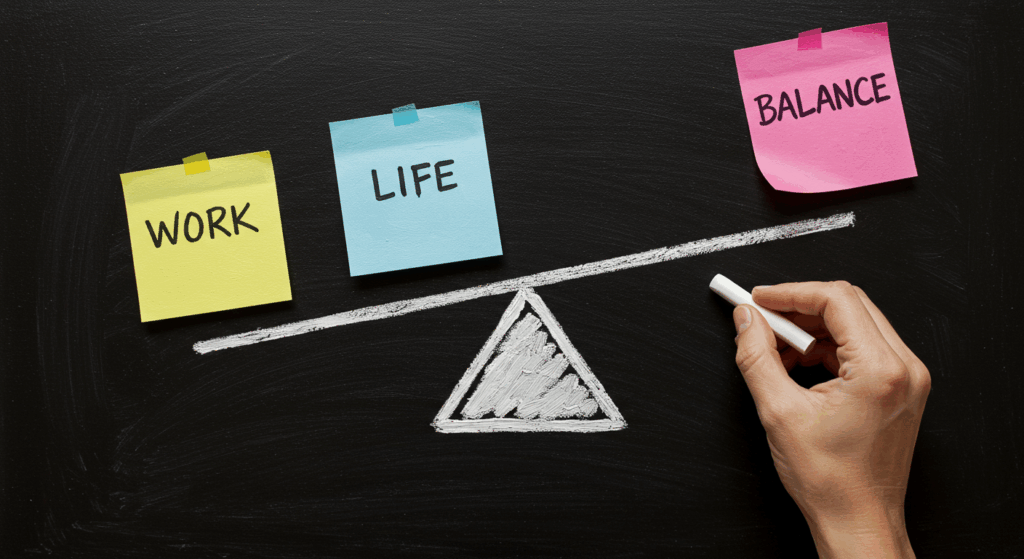Hey friend, let’s get real about burnout
So… you’ve been feeling wiped, right? Life’s been hitting you from all sides—work emails, dating apps dinging, that fear of missing out on another Netflix drop, plus responsibilities piling up like laundry. Welcome to Real Talk: Job Life. Burnout isn’t a badge of honor, I promise. It’s more like your brain waving a flag that says, “hey, we’re low on juice here.”
But here’s the thing—this isn’t just a made-up “millennial problem” (though yes, we kinda coined it), it’s real. Gen Z and millennials are literally burning out earlier than ever—like, stress peaks around age 25 for a lot of us. Finances, work, wanting to look put together on Insta… it’s a lot. But the good news? There are little life-hacks (or big ones) you can weave into your routine, ones that help more than just binge-watching a comfort show (though, yeah, that can be comforting too).
This is your Real Talk: Job Life cheat sheet—starting with how to spot the signs, then sneaky hacks to slow the burnout train down. Also, expect some typos or weird phrasing—just my human brain at work, hmu if you catch one.
So… what even IS burnout, and how do I notice it?
No shame if you don’t immediately know—it creeps up. Common early warning signs:
- You’re chronically exhausted, even after 8 hours of sleep (ugh).
- You snap at tiny things—like your Spotify buffering.
- Motivation? Gone. Tasks that used to feel meaningful now feel like chores.
- Your body’s throwing symptoms too—headaches, tummy issues, crappy sleep or weird appetite shifts.
- You kinda ghost your friends or feel like nope on social life. All normal red flags.
Real quick: sometimes we brush it off as “just tired,” but honestly, heads-up now means stepping in before it’s full-on crash mode.
Burnout Prevention Hacks—IRL style
1. Boundaries are like… sacred, okay?
Putting up little “no-entry” fences is key. Try:
- Deciding work hours and actually sticking to them, even if temptation to “just check one email” is strong.
- That Reddit story where someone took two phones—one for work, one for personal life? Genius. Clearly says, “You’re not getting my memes after 6 PM, boss.”.
- Being clear with friends/fam: “Hey, need a chill evening, catch me later?”
- Scheduling you time like a damn Doctor’s appointment.
2. Self-care—more than bubble baths, promise
Yes, bubble baths are cool. But the deeper stuff includes:
- Sleep—shoot for 7–9 hours, same bedtime if you can (helps more than naps).
- Move a little. Walk, dance, do TikTok, stretcth, whatever—not strenuous—just keep bodies grooving for mood boost.
- Food—keep it balanced. A sad office snack isn’t doing your brain any favors.
- Even 5–10 min of mindfulness—meditate, breathe, journal—helps get a sense of calm.
- Laugh—like, actual laughter. It reduces anxiety and improves mood physically, like neuro-magic in your body.
3. Know your “keystone habits” and warning signals
- Keystone habits = things that helped you before and still can. Maybe for you it’s cooking a weird recipe, or Spotify deep-diving, or daily dog walks. Identify and stick with them.
- Learn your burnout tell. It might be restless legs, a buzzed heart, or snapping appetite. When that hit happens, take a breath and pause.
4. Slow down—even if “busy” feels like a status badge
- Do one “slow activity” a day—like eat somewhere comfy (not at your desk), walk without scrolling, read something short just because. These micro-pauses do wonders.
5. Build real-life connections
- Socializing isn’t optional—it’s legit medicine. Face-to-face chats, hugs, energy. Doesn’t have to be deep, maybe it’s just people to laugh with.
- Join groups/interests—knitting circle, gaming clan, hiking crew, whatever gives community vibe.
6. Reframe your perspective and take “oasis moments”
- Break tasks down. Focus on small wins. Celebrate them even if it’s just “I turned off my alarm on time”.
- Shift how you view tasks—less “ugh must-do” and more “chance to feel something accomplished.”
- Oasis moments = planned breaks. Lunch away from screens, quick walks, phone-free pause. Purpose-built recharge zones.
7. Talk about it—or to someone
- Seriously, talking helps. A good listener can calm your nervous system even if they can’t fix your boss
- Therapy isn’t only when you’re “super broken.” Think of it like dentist visits—preventive care for your brain.
8. Align with values and set realistic goals
- Ask yourself—what feels meaningful right now? Align what you do to that, even slightly.
- Set micro-goals. Small steps mean progress without meltdown.
9. Unplug and reclaim control
- Try phone-free zones—especially in your bedroom. I know… rough. But it improves sleep and gives mental space.
- Digital detox—take breaks from scrolling, like blocks per day or set “no-app” times. Protect your calm.
10. Work ecosystems: change what you can at the source
- If your job situation is draining you (lack of control, unfair load, mismatch in values), see if you can tweak it—say no, ask for resources, improve fairness or clarity
- If it’s systemic, maybe it’s time to consider bigger changes—but step by step.
Real Job Life—How Gen Z & Millennials are doing it differently
You know how older generations might’ve just power-through? Well, we’re flipping the script. Gen Z especially is pushing for emotional sustainability—not just hustling until we break. We take mental health days and don’t feel obligated to justify them anymore. We recognize early, we talk, we set boundaries—and we call it self-respect.
And hey, trust phones divided by role—that Reddit millennial’s hack? I might adopt that too.
So Real Talk: Job Life isn’t about preaching self-care; it’s about the actual life-hacks we keep using—even when we’re tired and messy. You’re not failing; you’re adapting.
Wrapping this up—the TL;DR in real talk style
- Burnout is sneaky, common, and early—especially for us.
- Recognize the signs: exhaustion, irritability, motivation flatline, weird body stuff, social withdrawal.
- Put up boundaries. Sleep, reset. Move, eat, laugh.
- Know what habits help you. Watch for your stress tells, and slow down regularly.
- Talk, connect, or get help—not alone in this.
- Align what you do with what matters. Celebrate teeny wins.
- Set phone-free zones, digital breaks.
- At work, advocate for fairness, boundaries, and resurces. If that fails, maybe time to rethink.
Alright, that’s the gist. Hope this feels like we’re just vibing on the couch, helping each other out. You got this. Even small hacks can save a day or a week or heck—a whole mood.
You’re not just surviving—you’re learning how to live smarter, not just harder. Take one tiny step today—maybe a pause, a walk, a no-phone meal. You’re worth the recharge.









